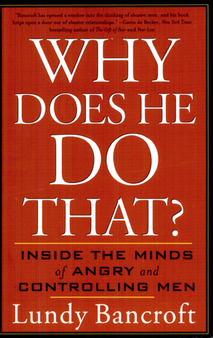 I happened to be scrolling through Instagram and found this excerpt split into quite a few Insta pages. I wanted to share it because I believe it is one of the most accurate, all-encompassing descriptions about chronic mistreatment in relationships that I've ever read. Why Does He Do That? By Lundy Bancroft Excerpt: One of the obstacles to recognizing chronic mistreatment in relationships is that most abusive men simply don’t seem like abusers. They have many good qualities, including times of kindness, warmth, and humor, especially in the early period of a relationship. An abuser’s friends may think the world of him. He may have a successful work life and have no problems with drugs or alcohol. He may simply not fit anyone’s image of a cruel or intimidating person. So when a woman feels her relationship spinning out of control, it is unlikely to occur to her that her partner is an abuser. The symptoms of abuse are there, and the woman usually sees them: the escalating frequency of put-downs. Early generosity turning more and more to selfishness. Verbal explosions when he is irritated or when he doesn’t get his way. Her grievances constantly turned around on her, so that everything is her own fault. His growing attitude that he knows what is good for her better than she does. And, in many relationships, a mounting sense of fear or intimidation. But the woman also sees that her partner is a human being who can be caring and affectionate at times, and she loves him. She wants to figure out why he gets so upset, so that she can help him break his pattern of ups and downs. She gets drawn into the complexities of his inner world, trying to uncover clues, moving pieces around in an attempt to solve an elaborate puzzle. The abuser’s mood changes are especially perplexing. He can be a different person from day to day, or even from hour to hour. At times he is aggressive and intimidating, his tone harsh, insults spewing from his mouth, ridicule dripping from him like oil from a drum. When he’s in this mode, nothing she says seems to have any impact on him, except to make him even angrier. Her side of the argument counts for nothing in his eyes, and everything is her fault. He twists her words around so that she always ends up on the defensive. As so many partners of my clients have said to me, “I just can’t seem to do anything right.” At other moments, he sounds wounded and lost, hungering for love and for someone to take care of him. When this side of him emerges, he appears open and ready to heal. He seems to let down his guard, his hard exterior softens, and he may take on the quality of a hurt child, difficult and frustrating but lovable. Looking at him in this deflated state, his partner has trouble imagining that the abuser inside of him will ever be back. The beast that takes him over at other times looks completely unrelated to the tender person she now sees. Sooner or later, though, the shadow comes back over him, as if it had a life of its own. Weeks of peace may go by, but eventually she finds herself under assault once again. Then her head spins with the arduous effort of untangling the many threads of his character, until she begins to wonder whether she is the one whose head isn’t quite right. To make matters worse, everyone she talks to has a different opinion about the nature of his problem and what she should do about it. Her clergyperson may tell her, “Love heals all difficulties. Give him your heart fully, and he will find the spirit of God.” Her therapist speaks a different language, saying, “He triggers strong reactions in you because he reminds you of your father, and you set things off in him because of his relationship with his mother. You each need to work on not pushing each other’s buttons.” A recovering alcoholic friend tells her, “He’s a rage addict. He controls you because he is terrified of his own fears. You need to get him into a twelve-step program.” Her brother may say to her, “He’s a good guy. I know he loses his temper with you sometimes—he does have a short fuse—but you’re no prize yourself with that mouth of yours. You two need to work it out, for the good of the children.” And then, to crown her increasing confusion, she may hear from her mother, or her child’s schoolteacher, or her best friend: “He’s mean and crazy, and he’ll never change. All he wants is to hurt you. Leave him now before he does something even worse.” All of these people are trying to help, and they are all talking about the same abuser. But he looks different from each angle of view. The woman knows from living with the abusive man that there are no simple answers. Friends say: “He’s mean.” But she knows many ways in which he has been good to her. Friends say: “He treats you that way because he can get away with it. I would never let someone treat me that way.” But she knows that the times when she puts her foot down the most firmly, he responds by becoming his angriest and most intimidating. When she stands up to him, he makes her pay for it—sooner or later. Friends say: “Leave him.” But she knows it won’t be that easy. He will promise to change. He’ll get friends and relatives to feel sorry for him and pressure her to give him another chance. He’ll get severely depressed, causing her to worry whether he’ll be all right. And, depending on what style of abuser he is, she may know that he will become dangerous when she tries to leave him. She may even be concerned that he will try to take her children away from her, as some abusers do. How is an abused woman to make a sensible picture out of this confusion? How can she gain enough insight into the causes of his problem to know what path to choose? The questions she faces are urgent ones. ABOUT THE AUTHOR For over twenty years Lundy Bancroft, the author of the national bestseller Why Does He Do That?, has specialized in counseling men who are unhealthy relationship partners, helping them make lasting changes. He is a former codirector at Emerge, the nation's first program for abusive men. http://lundybancroft.com
0 Comments
Your comment will be posted after it is approved.
Leave a Reply. |
Categories
All
Archives
June 2024
|
|
All rights reserved. 2022.
|

 RSS Feed
RSS Feed



